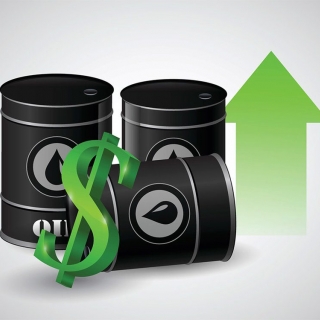


Oil prices were volatile on Monday, after jumping 7% on Friday, as fresh attacks by Israel and Iran over the weekend raised concerns that fighting could spread across the region and significantly disrupt oil exports from the Middle East.
Brent crude futures rose 64 cents, or 0.86%, to $74.87 a barrel by 0507 GMT, while U.S. West Texas Intermediate crude rose 76 cents, or 1.04%, to $73.74. Oil prices had jumped more than $4 a barrel earlier in the session and also briefly dipped into negative territory.
Both benchmarks closed 7% higher on Friday, after jumping more than 13% during the session to their highest levels since January. Iranian missiles struck Tel Aviv, Israel, and the port city of Haifa on Monday, destroying homes and raising concerns among world leaders at this week's G7 meeting that fighting between the old foes could lead to a wider regional conflict.
Exchanges of fire between Israel and Iran on Sunday resulted in civilian casualties, with both militaries urging civilians on the opposing side to take precautions against further attacks.
The latest developments have raised concerns about disruptions in the Strait of Hormuz, a vital shipping lane. About a fifth of the world's total oil consumption, or about 18 to 19 million barrels per day (bpd) of oil, condensate and fuel, passes through the strait.
"Buying was driven by the ongoing Israel-Iran conflict, with no resolution in sight," said Toshitaka Tazawa, an analyst at Fujitomi Securities.
"But as seen last Friday, some of the selling came on concerns about overreaction," he said. While the market is watching for potential disruptions to Iranian oil production from Israeli attacks on energy facilities, growing concerns over a blockade of the Strait of Hormuz could push prices up sharply, Tazawa added.
Iran, a member of the Organization of the Petroleum Exporting Countries (OPEC), currently pumps about 3.3 million barrels of oil per day and exports more than 2 million barrels of oil and fuel per day.
The spare capacity of OPEC and its allies, including Russia, to pump more oil to offset any disruptions is roughly equivalent to Iran's production, according to analysts and OPEC watchers.
"If Iranian crude exports are disrupted, Chinese refiners, the sole buyers of Iranian crude, will need to look for alternative oil grades from other Middle Eastern countries and Russian crude," Richard Joswick, head of short-term oil analysis at S&P Global Commodity Insights, said in a note.
"This could also increase freight rates and tanker insurance premiums, narrowing Brent-Dubai spreads and hurting refinery margins, particularly in Asia," Joswick added.
US President Donald Trump said on Sunday he hoped Israel and Iran could broker a ceasefire, but added that sometimes countries have to fight first. Trump said the US would continue to support Israel but declined to say whether he had asked the US ally to halt its attacks on Iran.
German Chancellor Friedrich Merz said he hoped a meeting of Group of Seven leaders meeting in Canada on Sunday would reach a deal to help resolve the conflict and prevent it from escalating.
Meanwhile, Iran has told mediators Qatar and Oman that it is not open to negotiating a ceasefire while under Israeli attack, an official briefed on the communications told Reuters on Sunday. (alg)
Source: Reuters
Oil prices stabilized on Thursday (February 12th), as the market reassigned a risk premium to US-Iran tensions despite US inventory data showing swelling domestic supplies. This movement confirms one ...
Oil prices rose on Wednesday (February 11th), supported by a combination of geopolitical risk premiums from US-Iran tensions and more solid Asian demand signals particularly from India which helped ea...
Oil remained in the green zone on Tuesday (February 10th), as the market refused to abandon the Middle East risk premium. As of 13:07 GMT (20:07 WIB), Brent rose +0.4% to $69.32/barrel, while WTI rose...
Oil prices fell about 1% on Monday as concerns about conflict in the Middle East eased slightly. The market calmed after the US and Iran agreed to resume talks on Tehran's nuclear program, reducing fe...
Oil prices moved slightly higher in a volatile session on Friday, as investors assessed the direction of nuclear negotiations between the United States and Iran. Price movements appeared sensitive to ...
Oil prices stabilized on Thursday (February 12th), as the market reassigned a risk premium to US-Iran tensions despite US inventory data showing swelling domestic supplies. This movement confirms one thing: geopolitical headlines are still more...
Gold prices weakened slightly on Thursday (February 12th), as more solid US employment data reduced market confidence in an imminent Federal Reserve interest rate cut. The strong employment data prompted market participants to shift expectations of...
The Hang Seng Index reversed its downward trend in Hong Kong on Thursday (February 12th), weakening by around 0.9% to around 27,000 after a strong session earlier. This decline halted the momentum of the short term rally, as investors began to...